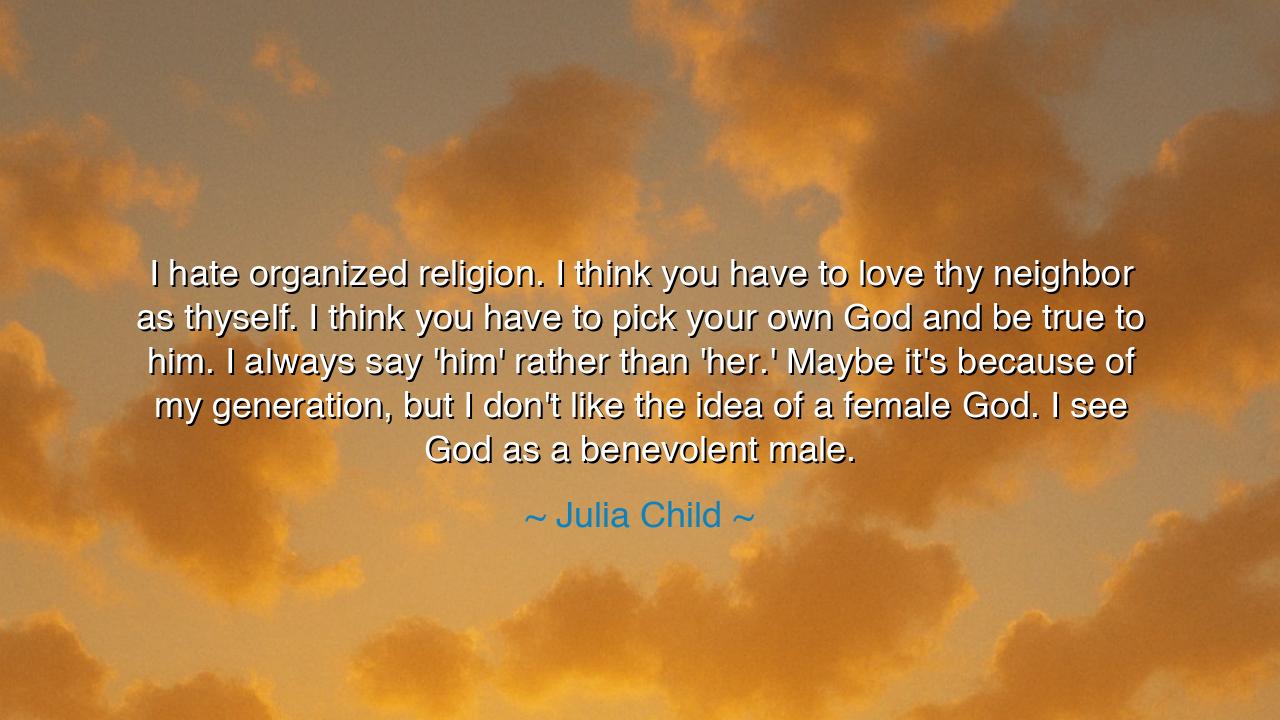
I hate organized religion. I think you have to love thy neighbor
I hate organized religion. I think you have to love thy neighbor as thyself. I think you have to pick your own God and be true to him. I always say 'him' rather than 'her.' Maybe it's because of my generation, but I don't like the idea of a female God. I see God as a benevolent male.






Julia Child, a woman remembered for her warmth and her joy in creation, once said with frankness and candor: “I hate organized religion. I think you have to love thy neighbor as thyself. I think you have to pick your own God and be true to him. I always say ‘him’ rather than ‘her.’ Maybe it’s because of my generation, but I don’t like the idea of a female God. I see God as a benevolent male.” In this declaration lies the soul of one who cherished authenticity over ritual, love over law, and personal conviction over inherited doctrine. It is not a denial of the divine, but a rejection of cages built around it.
From the earliest days of mankind, religion has risen as both blessing and burden. At its best, it teaches mercy, justice, and reverence. At its worst, it imprisons the spirit within rules and hierarchies that smother love. Julia’s rejection of organized religion reflects an ancient conflict: between the living flame of faith and the structures that often smother it. She takes refuge instead in the central commandment known to prophets and sages alike—love thy neighbor as thyself—for in that one principle all higher law is fulfilled.
The ancients knew this truth. The Hebrew prophets cried that God desired mercy, not sacrifice; justice, not ritual. The Buddha left the palace to seek compassion, not ceremony. Christ Himself declared that love of God and love of neighbor were the two greatest commandments, upon which all the law and prophets rest. Julia, though not speaking as a theologian, speaks with their same wisdom: that love, not structure, is the essence of the divine.
Consider the life of Francis of Assisi. Born into wealth, he abandoned riches and rejected the growing bureaucracy of the medieval church. He walked barefoot among the poor, preaching that God’s presence was found in the leper, in the beggar, even in the sparrow. Though religion around him was organized into cathedrals and councils, he chose the path of simplicity and personal faith. Like Julia, he believed that true devotion was not in conformity to a system but in living love day by day.
Her words also reveal a generational truth. She confesses that she always thought of God as male, not because of eternal truth, but because of her upbringing. In this honesty, she shows us how deeply culture shapes even our vision of the divine. To some, God is Father; to others, Mother; to others still, Spirit beyond gender. What matters, Julia reminds us, is not the image, but the benevolence we see in it. The heart seeks a God who is good, merciful, and trustworthy. That is enough.
The lesson is clear: do not confuse the shell with the seed. Organized religion can inspire, but it can also suffocate. Structures may guide, but love must rule. Find the form of the divine that speaks most truthfully to your soul, and walk faithfully with it. Do not despise others for their vision, nor force your own upon them. What matters most is that in your daily life you practice compassion, humility, and reverence for life.
Practical wisdom flows from this: live your faith, do not argue it. If you love your neighbor, if you act with kindness, if you are true to the God of your understanding, then your life becomes a prayer more powerful than sermons. Honor traditions if they strengthen you, but never allow them to replace the living essence of love. Remember that a banquet without joy is empty, and a religion without love is hollow.
So remember, O children of tomorrow: be true to your God, but above all, be true to love. Organized creeds may rise and fall, names of the divine may shift like sands, but the eternal law remains: to love your neighbor as yourself. In this law is freedom, in this law is truth, and in this law, as Julia herself saw, lies the very heart of God—benevolent, enduring, and close to all who seek Him.






AAdministratorAdministrator
Welcome, honored guests. Please leave a comment, we will respond soon